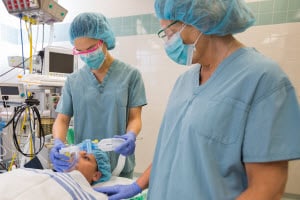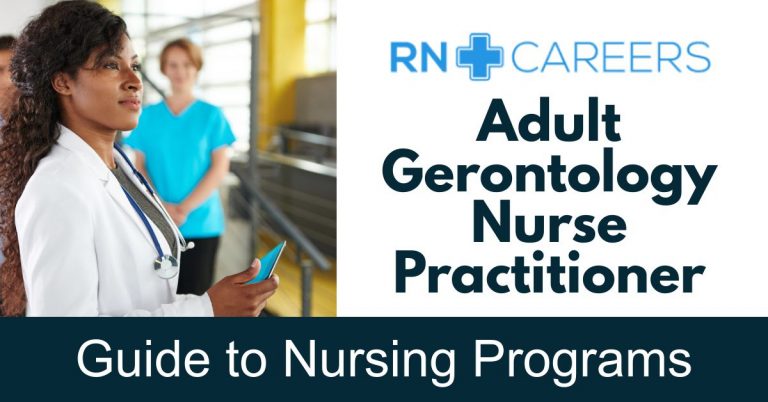Certified Nurse Midwife Career and Education Overview
- What You Will Do: Provide primary care for women with a focus on reproductive health before, during, and after pregnancy, including diagnosing and treating sexually transmitted diseases, caring for newborns, prescribing contraception and more.
- Where Will You Work: Hospitals, private practices, patient’s homes, reproductive health clinics, birthing centers
- Employment Projections: Employment of Certified Nurse Midwives (CNMs) is anticipated to grow by 31 percent between 2016 and 2026.
- How Much Will I Earn: CNMs make between $95,000 and $118,000 annually.
- Number of Programs: There are 39 CNM programs in the U.S.
- How Long Does It Take to Become an CNM: A master’s degree to become a CNM after your BSN will take about 2 years. Doing an RN to MSN program will take around 2 to 3 years as will a program that prepares you to be an RN and CNM at the same time.
- Requirements to Become One: To be a CNM you need a bachelor’s degree and a master’s in nursing, as well as an active RN license and state licensure as a CNM.
Eight Steps to Become a Certified Nurse Midwife
- Earn Your RN – First you must become an RN by completing a program that is CCNE or ACEN accredited. This BSN guide can help you find the right path for you.
- Pass The NCLEX-RN Exam – To become an RN you must pass the NCLEX-RN exam. This NLCEX-RN study guide, along with the right study habits can help you get through it.
- Earn Your MSN – During your CNM training you will take classes in childbearing, health assessment, sexual and reproductive health, pathophysiology and more.
- Complete Supervised Clinical Hours – Depending on your university you will be required to complete a certain number of supervised clinical hours as well as attend a certain number of births.
- Become Board Certified – The American Midwifery Certification Board (AMCB) administers the exam to certify CNMs.
- Obtain Licensure – After you are certified nationally you can get licensed as a CNM in the state where you want to work.
- Obtain a DEA Number – For prescriptive rights you must get a DEA registration number.
- Maintain Active Certification and Licensure – Every 5 years you must either complete AMCB Certificate Maintenance Modules, pay annual fees, obtain 20 continuing education (CE) hours, and complete the recertification application, or re-take the certification exam and pay the $500 fee. You must obtain state licensure through your state’s Board of Nursing (BON) and maintain active BLS, RN, and DEA licenses.
What is a Certified Nurse Midwife?
The term “midwife” can get a bit confusing. There are a handful of different types of midwives out there that in some capacity provide care to women. However, only a Certified Nurse Midwife is an Advanced Practice Registered Nurse (APRN) who is prepared to provide care to women before, during, and after childbirth. A Certified Midwife (CM) is a midwife who is not a nurse but has a bachelor’s degree in some type of health science and who has completed a training program that prepares them to care for women. CMs are only recognized in 5 states whereas CNMs are recognized and can practice independently in all 50. Both CNMs and CMs are certified by the AMCB. As a CNM you can expect to care for the gynecologic and obstetrical needs of women throughout their lifespan. Additionally, you will be trained to deliver babies and will be able to diagnose and treat patients independently. You will be able to work in a variety of settings and will do everything from providing patient education regarding pregnancy to prescribing contraceptive methods and performing minor surgical procedures. You will have the skills to work in a variety of practice settings such as labor and delivery floors, primary care clinics, and patient’s homes.
A Note on Direct Entry Midwifery
While many APRN programs have “Direct Entry” options for non-nurses to become nurse practitioners, the term “Direct Entry” means something different when talking about midwifery. A Direct Entry Midwife is one who is educated in midwifery through apprenticeship and either a midwifery school or university program. A Direct Entry Midwife is not a nurse and they primarily work outside of hospitals in home environments. There are 27 states that certify Direct Entry Midwives, but it is important to note that this is not a nursing career and the scope of practice is different from nurse midwives. There are options for non-nurses to enter a master’s program to become both an RN and CNM, but these are not typically called Direct Entry programs.
How Do I Become a Certified Nurse Midwife?
Being a CNM means that you will have to obtain a bachelor’s degree and a master’s degree in nursing that focuses on midwifery and is from a university accredited by the American Commission for Midwifery Education (ACME). If you are not yet an RN, there are many midwifery programs that will prepare you become one during your master’s.
- BSN to MSN: If you have a BSN you can enter a traditional CNM program and complete it in 2 years.
- Bachelors to MSN: Of the 39 ACME accredited midwifery programs 22 do not require that you be an RN to start the program. These programs have options for non-nurses to finish the master’s program in 3 years instead of 2 and become an RN in the process. If you are not an RN and wish to enter a CNM program you should check to see what pre-requisite courses you will need to take. These will likely include biology classes, chemistry class, as well as anatomy and physiology.
- BSN to DNP: There are doctorate in nursing practice (DNP) programs that prepare you to be a nurse midwife. This will take about 4 years of school. DNP programs prepare APRNs to use integrate research into their clinical practice and be leaders in the healthcare environment.
- MSN to DNP: If you are already a CNM and have your master’s in nursing you can get your DNP in around 3 years.
Certification and Licensure: National certification as a nurse midwife shows that you are prepared to clinically care for women. After you complete your midwifery program you can become certified by taking the midwifery exam administered by the AMCB. Once you are certified you can apply for state licensure as a CNM. To stay certified you must meet certain requirements during every 5-year certification renewal period. This 5-year cycle starts the year after your initial certification. You have two options to recertify:
- Complete 3 AMCB Certificate Maintenance Modules, obtain 20 contact hours of CE units, pay annual fees, and complete the recertification application.
- OR take the AMCB Certification Exam no later than the 4th year of your recertification cycle; pay the $500 National Certification Exam fee instead of the annual fees; and complete the recertification application.
Licensure is what shows that you are legally able to practice as a CNM in your state. After you get your certification you can submit an application with your transcripts, RN license, national certification, and a fee to your state’s BON to get licensed as a CNM.
Where Do Certified Nurse Midwives Typically Work?
You can work in various settings where healthcare is provided to women. These can include labor and delivery floors, postpartum units in hospitals, birthing centers, patient homes, private practices, community health clinics and more.
Certified Nurse Midwives Salary
As with most professions CNM salaries vary depending on the state, city, and setting where you work. According to the Bureau of Labor Statistics the median annual wage for CNMs is $99,770. In general, CNMs can make between $96,000 and $120,000. How much experience you have can influence your salary. Urban areas typically pay more than rural ones, but the cost of living is also usually higher. Additionally, if you choose to work in a medically underserved area you may be eligible for programs that will help you pay off your student debt. The Nurse Corps Loan Repayment Program and the Public Service Loan Forgiveness Programs are two examples of such programs. Certain types of loans such as Perkins Loans may be eligible for loan forgiveness as well.
Online Certified Nurse Midwife Programs
Even though you will have to complete supervised clinical hours and attend a certain number of births, there are online CNM programs that give you the flexibility to complete course requirements from the comfort of your home. These programs enable aspiring CNMs to continue to stay committed to their personal life while pursuing their masters. Some programs are fully online, while others are a hybrid of online and in person lectures.
What is a Typical Certified Nurse Midwife Curriculum?
There can be some variation to your curriculum depending on which university you choose to go to. In general most schools will have courses similar to what is offered at the University of California San Francisco:
- Advanced Health Assessment
- Women’s Health
- Intro to Antepartum Management
- Contraception
- Disparities in Women’s Health
- Advanced Pharmacology
- Antepartum Complications
- Intrapartum Management
- Pediatric Physiological Management
The Role of the CNM in the Primary Care Provider Shortage
With the Affordable Care Act shifting healthcare focus onto primary and preventative care, there is an anticipated drastic increase in need for primary care providers between 2013 and 2025. CNMs are extensively trained in providing primary care to the female population and thus provide a way to fill this shortage. CNMs focus on disease prevention and health promotion that will help patient’s stay on top of their health.
List of Certified Nurse Midwife Programs – Online and Campus
In the U.S. there are 39 CNM programs with many offering partial or fully online options.
Certified Nurse Midwife – CNM Resources
- American Midwifery Certification Board
- American College of Nurse Midwives
- National Midwifery Institute
Denisco, S. M., Barker, A. M., (2016). Advanced practice nursing: Essential knowledge for the profession. Burlington, MA: Jones and Barlett Learning.
- About the Author
- Latest Posts
Lauren is a Registered Nurse and Women’s Health Nurse Practitioner who works in an OB/GYN clinic in the Boston area. She completed a Direct Entry MSN program at Boston College in May 2017 after obtaining a BS in Forensic Science and a BS in Biology from the University of New Haven, so she has special awareness of how confusing the many paths to nursing can be! She is passionate about enhancing and clarifying the nursing role globally as well as combatting human trafficking from a public health standpoint. In her free time Lauren enjoys writing and traveling.


![10 Benefits of Becoming a Nurse Practitioner in [year] 3 10 Benefits Of Becoming A Nurse Practitioner In 2024](https://www.rncareers.org/wp-content/uploads/2023/05/Benefits-of-Becoming-a-Nurse-Practitioner-768x507.jpg)




